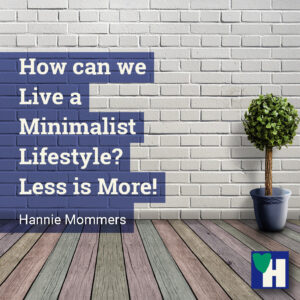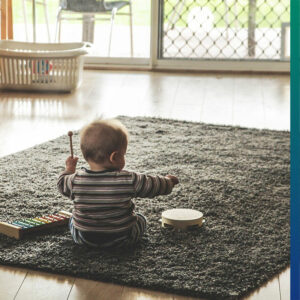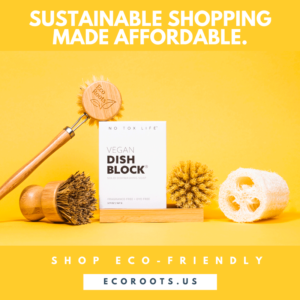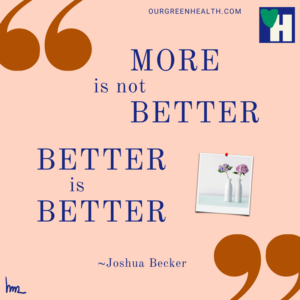
One of the ways to sustainable living can mean we live a minimalist lifestyle. I have to admit that although I am truly trying to have a sustainable lifestyle, I am not good (yet) at being a minimalist.
As an artist, I see value in almost everything. A piece of package paper can be used in collages; leftovers of fabric will probably come in handy as a pillow cover; a beautiful stone or crooked branch is beautiful in itself.
And so things pile up.
Joshua Becker, a blogger, remarks “Minimalism involves intentionally promoting the things we value most while getting rid of everything else that hinders us from doing so.” Difficult, but worth trying.
Some of the links are affiliate links. As an affiliate associate, we earn a commission when you purchase any of the products offered through the shared links at no extra cost for you. This helps us maintain this website.
Table of contents
Why would we want to live a minimalist lifestyle?
There can be many reasons to live a minimalist lifestyle. Health, spirituality, the pursuit of work-life balance, sustainability, personal development, being frugal, response to materialism and overconsumption, desire to lower stress, or prefer quality time for family and friends.
Declutter your life by decluttering your house

25% of US residents have a clutter problem! I don’t expect that percentage to be much different in Europe. Although the houses I visited in America looked different from the houses of my European friends.
In our former home I had a William Morris quote on a closet door: Have nothing in your house that you do not know to be useful or believe to be beautiful. That ties in nicely with the questions we can ask ourselves if we want to get rid of our clutter:
- Do I need it?
- Am I using it?
- What would I use if I didn’t have it?
- Why do I have it?
Less is more
The architect Ludwig Mies van der Rohe introduced the quote “Less is more”. For years, I have applied that principle in my design practice. Strangely enough exclusively in my work, I never made the connection to my private life.
Any serious thoughts about living a minimalist lifestyle popped up around our move to Spain.
A few years before we actually moved, we put our house up for sale. A major clean-up was necessary for the photo presentation and the viewings.
Our house, combined with workspaces for our companies, was very big. Perhaps you know from your own experience what the pitfall of a large house is: it is no problem to store things.
Phew, what a huge pile of stuff we had.
Related: How can Shopping be Sustainable? Tips and Best Practices
Is a minimalist lifestyle useful?
Saving money
If you want to have financial freedom, it is better to save money than to earn more money. People who start earning more tend to spend more.
Artists call it “One gig from broke”. It only takes one hitch and trouble is there. If you don’t use that much, you don’t miss much when things go wrong.
More time for what matters
If we don’t have to clean up a lot (because we simply don’t have much), we have more time to spend with our children or grandchildren, for example. Or for relaxed gardening, which can also provide fruit or vegetables for our own consumption.
Improving our well-being
Stuff brings stress. They need maintenance, can break down, or need to be cleaned up. It can be very satisfying to have an empty desk or a tidy closet so we don’t have to put in extra work.
Sustainable
Not having huge piles of stuff, means not a lot will be thrown away eventually. That is good for the environment. Not buying lots of stuff saves on transportation and packaging.
Related: 9 Tips to Reduce Packaging for Consumers (and Listening Producers)
Possess higher-quality items
Buying less gives us the opportunity to purchase a better quality. Cheap t-shirts have a short lifespan and look flimsy after one wash. Quality t-shirts will keep their shape and color and will be much more fun to wear.
Easier to clean
Almost empty shelves are easier to keep clean than shelves with all kinds of knickknacks. Clothes in the closet that can hang more loosely crumple less.

Increasing productivity
Imagine the time saved if we don’t go to the store often or have less junk to clean up. We can devote the time saved to more important goals in our lives.
Being more grateful and mindful
Our lives take on more meaning when we have time to be thankful for what we have, instead of yearning for what we lack.

Lead by example
By living minimalist, we teach our children and grandchildren what the real values are in life. It’s not what we own or the big gifts we shower them with that impress, but the memories of joint activities.
Less work later, for us or someone else
When my mother had to go to the nursing home, Tom and I had to empty her flat. We had very little emotional connection with her belongings, so most of them were recycled or thrown away.
As you can imagine, it took days of work. I can only hope that by the time our house has to be cleaned out, we won’t have that much stuff.
Tips to achieve a minimalist lifestyle

- Analyze the available space;
- What are your priorities;
- Clean up;
- Clear digital clutter as well;
- When you start, do the visible areas first;
- Take it room by room, give yourself time;
- Consider your purchases before making them;
- Invest only in high-quality products;
- Be thankful for everything you have;
- Make a habit of tidying up regularly;
- Get organized by creating systems and processes;
- Keep it clean as you go;
- Don’t attach yourself to material things;
- Decorate only with meaningful items;
- Don’t be afraid of empty spaces;
- Identify your purpose;
- Say no more often;
- Reuse, repurpose, resell.
Live a minimalist life
Nowadays there is a lot of attention for minimalist lifestyles. Think of the Japanese cleaning guru Marie Kondō, or the Tiny House Movement. This doesn’t mean it’s new.
The Buddhists traditionally have a minimalist lifestyle, which also applies to ascetic monks.
It should be clear from this article that Tom and I are not there yet, although we are well on the way. In any case, we already love minimal music and minimal art. 🙂
Do you have any tips for us to live more minimalist? Tell us in the comment box.



I am a moderate human, somewhere in the middle between a minimalist and a hoarder. Tried the minimalist approach for a while but I noticed I just kept finding excuses to keep some of the stuff I wanted to throw/donate. I find inspiration in everything so having a desk with just my laptop on it and the occasional flower vase seems miles away from my current situation – stack of magazines, my three notebooks, jars with pens, paintbrushes, markers, two small statues and three deep-green potted plants.
Hi Serenity,
Thank you for your comment.
Personally, I appreciate your current situation. Sounds more lively to me. Perhaps that’s just a projection of me, because my office is also ‘very lively’.
Books everywhere. Despite the fact that I decided on a ‘book-buying moratorium’, I can’t stop. Fortunately, at present, I have an e-reader. This really saves me space. Besides, I can easily take it with me.
I’ve also a lot of art pieces, paintings, and sculptures, in my office. These also add to the liveliness.
Perhaps liveliness is better?
Regards,
Tom
I agree with you, minimalism isn’t about owning less than you need, it’s about owning exactly what you need. If you’re looking for easy ways to become a minimalist, you should follow those tips above. Thanks!!
Hi Joseph,
Thank you for your comment. It’s always nice to meet like-minded people.
The challenge is, of course, to determine what you need. From our experience, I noticed that our needs change given time.
Being young with children requires a substantially different lifestyle. Just because of the natural fact that children grow ever so quickly, you need to change their clothes and shoes almost every half year or even faster.
When you’re older, and the children live on their own, nothing changes much over time. Unless your children and grandchildren come and visit you now and then. This means that you need a lot of stuff you only use when they visit you.
A minimalist life is quite a challenge. Yet it’s worth the effort.
Regards,
Tom